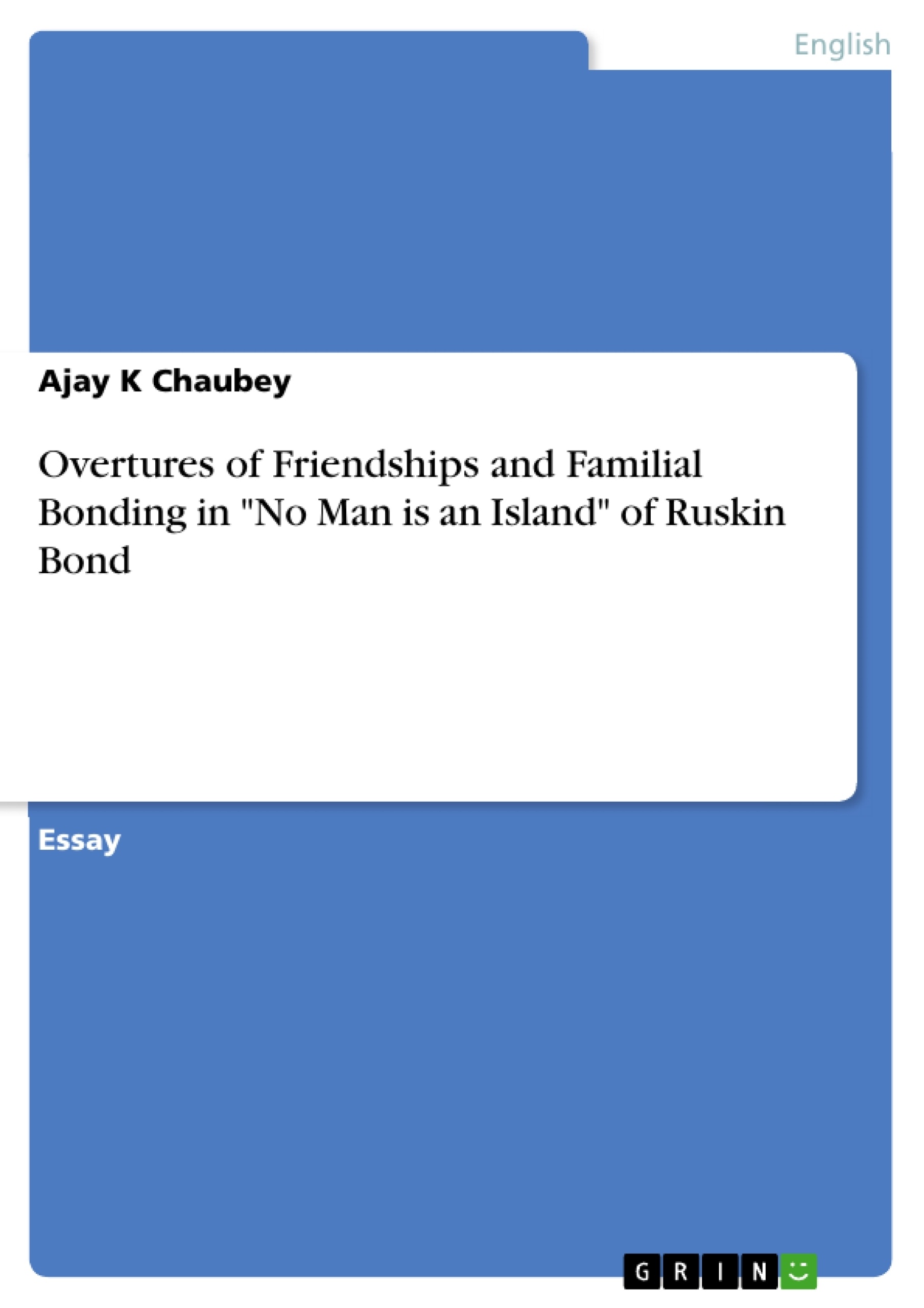The present paper is a humble endeavour to map the familial and friendly association in literature with special reference to Ruskin Bond’s select stories of "No Man is an Island" (2013), a collection of short stories and poems. The lineage and genealogy of literature display that Bond is not the first author to write, to narrate and to exhibit the ebullient ambience of family and friendly folks. Chaucer’s “The Canterbury Tales” marvellously archive the collective enterprise of his twenty nine characters who friendly embark upon the journey from the Tabard Inn to Thomas Bicket’s Church. The present paper underscores the chore of friendship in family and family in friendship which is the verisimilitude of individualistic as well as pluralistic lives.
Table of Contents
- Abstract
- Chapter 1: Untouchable
- Chapter 2: The Thief
- Chapter 3: The Last Truck Ride
Objectives and Key Themes
This paper aims to examine the portrayal of familial and friendly relationships in select short stories by Ruskin Bond, specifically from his collection No Man is an Island (2013). It explores how these relationships are depicted within the context of broader societal changes and contrasts Bond's approach with that of other authors throughout literary history.
- Familial bonds and their complexities
- The role of friendship in shaping individual lives
- The impact of societal changes on relationships
- Exploration of class and social inequalities
- The relationship between humanity and nature
Chapter Summaries
Chapter 1: Untouchable: This story, narrated from the first-person perspective, explores the friendship between two boys from starkly different social backgrounds – a sweeper boy and the son of a “brown sahib.” The narrative highlights the narrator's internal conflict between societal expectations and his personal connection with the sweeper boy. The author masterfully portrays the complexities of class divisions in colonial India and the narrator's evolving understanding of prejudice and societal norms. The story's ending, with the imagery of the rainy season and the scent of wet earth, symbolizes the burgeoning of a cross-caste amity. The story subtly critiques colonial structures and celebrates the inherent human need for connection that transcends social barriers.
Chapter 2: The Thief: This chapter presents a nuanced exploration of friendship, betrayal, and redemption. Two wandering boys form an unlikely friendship, built initially on lies and a shared experience of poverty. The narrative focuses on the internal conflict of the narrator, who faces a moral dilemma: to steal from his friend or not. The author uses this situation to highlight the themes of poverty, illiteracy, and the pressures that drive individuals to dishonesty. The narrator's eventual return of the stolen money signifies a moral awakening and underscores the value of honesty and trust over material gain. The story's complexity explores the grey areas of morality and the enduring power of redemption.
Chapter 3: The Last Truck Ride: This story shifts focus from interpersonal relationships to explore the devastating effects of deforestation, drought, and poverty on rural communities. While the narrative features a friendship between a young boy and a Sikh truck driver, the primary focus is on the harsh realities of rural life and the boy's struggle for survival. The author vividly portrays the inequalities of colonial India and the exploitation of laborers. The juxtaposition of the boy's concern for the wounded truck driver with the callous disregard of the contractor showcases social injustices. The story's powerful depiction of environmental degradation serves as a reminder of the delicate balance between humanity and nature.
Keywords
Family, friendship, Ruskin Bond, No Man is an Island, children's literature, social inequality, colonialism, environmental degradation, poverty, morality, redemption, human relationships, nature.
Ruskin Bond's "No Man is an Island": A Comprehensive Overview - FAQ
What is this document about?
This document provides a comprehensive preview of an academic paper analyzing Ruskin Bond's short stories from his collection, "No Man is an Island" (2013). The focus is on the portrayal of familial and friendly relationships within the context of broader societal changes in colonial India.
What are the main themes explored in the paper?
The paper explores themes of familial bonds and their complexities, the role of friendship, the impact of societal changes on relationships, class and social inequalities, and the relationship between humanity and nature. These themes are analyzed through a close reading of selected short stories.
Which stories are analyzed in the paper?
The preview specifically mentions three stories: "Untouchable," "The Thief," and "The Last Truck Ride."
What is the objective of this academic paper?
The paper aims to examine how Ruskin Bond portrays familial and friendly relationships in his short stories and compare his approach to other authors throughout literary history, considering the backdrop of societal shifts.
What are the key takeaways from each chapter summary?
Chapter 1: Untouchable: Explores the friendship between boys from different social classes in colonial India, highlighting class divisions and prejudice. The ending symbolizes cross-caste amity.
Chapter 2: The Thief: Focuses on friendship, betrayal, and redemption among impoverished boys, exploring themes of poverty, illiteracy, and the pressures leading to dishonesty. The narrator's actions showcase a moral awakening.
Chapter 3: The Last Truck Ride: Shifts focus to the devastating effects of deforestation, drought, and poverty on rural communities, highlighting social injustices and the impact of environmental degradation.
What are the key words associated with this paper?
Key words include: Family, friendship, Ruskin Bond, No Man is an Island, children's literature, social inequality, colonialism, environmental degradation, poverty, morality, redemption, human relationships, nature.
What is included in this preview?
This preview includes the title, table of contents, objectives and key themes, chapter summaries, and key words of the academic paper.
What type of academic work is this preview for?
This is a preview for an academic paper, intended for academic use and analysis of themes in a structured and professional manner.
- Arbeit zitieren
- Ajay K Chaubey (Autor:in), 2015, Overtures of Friendships and Familial Bonding in "No Man is an Island" of Ruskin Bond, München, GRIN Verlag, https://www.hausarbeiten.de/document/289250


